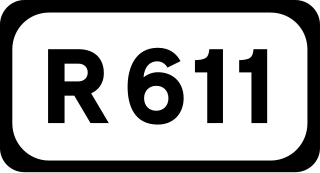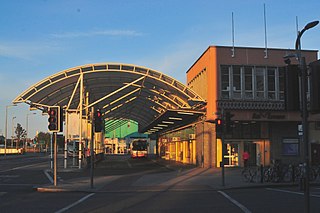
Carrigaline is a town and civil parish in County Cork, Ireland, situated on the River Owenabue. Located about 12 kilometres (7.5 mi) south of Cork city, and with a population of 18,239 people, it is one of the largest commuter towns in the county. The R611 regional road passes through the town, and it is just off the N28 national primary route to Ringaskiddy. Carrigaline grew rapidly in the late 20th century, from a village of a few hundred people into a thriving commuter town although some locals still refer to it as "the village". The town is one of the key gateways to west Cork, especially for those who arrive by ferry from France. Carrigaline is within the Cork South-Central Dáil constituency.

Crosshaven is a village in County Cork, Ireland. It is located in lower Cork Harbour at the mouth of the River Owenabue, across from Currabinny Wood. Originally a fishing village, from the 19th century, the economy of the area became more reliant on a growing tourism industry.

Turners Cross is a ward on the south side of Cork City in Ireland, and home to the Roman Catholic parish of the same name.

The R113 road is a regional road in Ireland. Located in Dublin, it forms a semi-orbital route around the south of the city. As of 2007, clockwise, it starts at the N31 at Temple Hill in Blackrock and ends at a junction with the N4 at Palmerstown.

The R611 road is a regional road in Ireland which runs from the N28 north of Carrigaline to Belgooly, all in County Cork.

The N28 road is a national primary road in Ireland. It connects the port and village of Ringaskiddy to the N40 South Ring Road in Cork city.
Daniel Desmond was an Irish Labour Party politician and Teachta Dála (TD) for seventeen years.
Fountainstown is a coastal village in County Cork, Ireland, situated approximately 23 km south of Cork city. A seaside village, it is separated by small promontory headland from the nearby village and beach at Myrtleville.

The River Owenabue, also spelled "Owenboy", is a river in County Cork, Ireland.

The Cork, Blackrock and Passage Railway (CB&PR) was a 3 ft narrow gauge railway in County Cork, Ireland. The line originally opened in 1850 as a 5 ft 3 in Irish standard gauge railway between Cork and Passage West and operated steam feeder ferries to other locations round Cork Harbour. The company was heavily dependent on summer tourist traffic for a considerable proportion of its revenue. The railway was converted to 3 ft narrow gauge in 1900 in conjunction with extensions southwards to Crosshaven which were completed in 1904. The railway closed in 1932 and has since been replaced by a public pathway and nature area.
The Cork City Railways were constructed in 1911 and opened in 1912 to connect the Irish standard gauge systems north and south of the River Lee in Cork, Ireland.

Cloghroe is a village and townland on the R579 road in County Cork, Ireland. It is 7 miles (11 km) northwest of Cork, close to Inniscarra and Tower. The Sheep River runs to the rear of the local pub Blairs Inn on the western side. The Wayside Inn is at the eastern end of the village. The origin of the name Cloghroe is from the Irish cloc rua meaning "red stone", which is common in the natural geography of the land. Cloghroe House is situated en route to the Inniscarra Community Centre. It was built in the middle of the 18th century and became the home of Elizabeth, second daughter of Joseph Capel, descended inherited residence of Sir Joseph Capel Judkin-Fitzgerald 4th Bt of Lisheen who died in 1917. Cloghroe village is a linear settlement consisting of one row of houses on each side of the road.

The N40 road is a national primary road in Cork City, Ireland. It is partial ring road skirting the southern suburbs of the city, from the N22 west of Ballincollig, via the Jack Lynch Tunnel under the River Lee, to the Dunkettle Interchange where it meets the N25 and N8/M8. The present N40 designation was created on 23 February 2012 via statutory instrument by renaming parts of the N22 and N25. The N40 serves as both a commuter route and a bypass of the city centre for traffic between parts southwest and east. The National Transport Strategy envisages building a "Cork North Ring Road" to complete the circuit in the 2030s.
The 2013–14 FAI Umbro Intermediate Cup was the 87th season of the FAI Intermediate Cup. Intermediate clubs from the Leinster Senior League, the Munster Senior League and the Ulster Senior League entered the competition. Avondale United finished as winners after they defeated UCD Reserves 3–0 in the final in Turners Cross. As a result Avondale United also became only the second club after Distillery to win the cup four times in a row. They also became the first club to win the FAI Intermediate Cup seven times, making them the competition's most successful club.

Parnell Place Bus Station is the principal bus station in Cork, Ireland, for Expressway and Regional services operated by Bus Éireann, InterCity services operated by GoBé, and international services operated by Eurolines.

The R287 road is a regional road in Ireland linking Sligo and the R280 in County Leitrim.
The South East Junior A Football Championship is an annual club Gaelic football competition organised by the Carrigdhoun Board of the Gaelic Athletic Association and contested by junior-ranked teams in the southeastern region of County Cork, Ireland, deciding the competition winners through a group and knockout format.
The 1888 Cork Senior Hurling Championship was the second staging of the Cork Senior Hurling Championship since its establishment by the Cork County Board in 1887. The draw for the opening round fixtures took place on 21 February 1888. The championship began on 3 March 1888 and ended on 29 April 1888. Due to the increased number of teams taking part, a divisional system was used.












